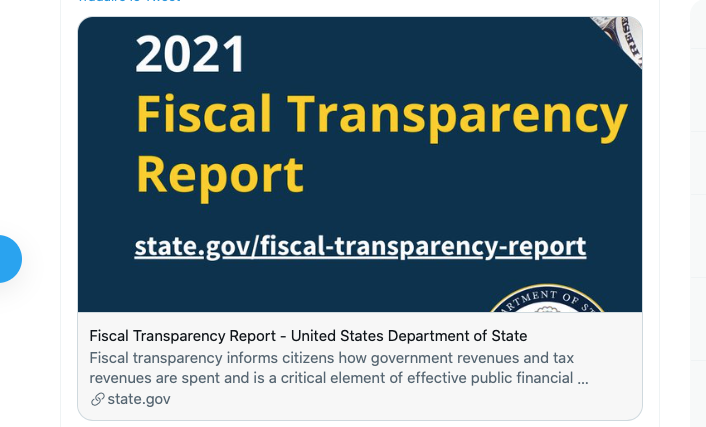BANK
AFRICA – Côte d’Ivoire, Togo and Burkina Faso among the examples of fiscal transparency (report)

As part of its 2021 Budget Transparency Report, the US Department of State has taken into account 141 countries around the world. 16 African states, seven of which from ECOWAS, meet the minimum tax transparency requirements as defined by Washington.
Côte d’Ivoire, Togo and Burkina Faso are among the countries meeting the minimum requirements for budgetary transparency. This is what the US State Department said in its 2021 Budget Transparency Report.
These three countries are the only ones in the WAEMU to be included in the first classification category, including countries that regularly publish reliable and accessible budgets and financial documents. A total of 16 African countries are included in this group, seven of which are members of ECOWAS. In addition to the countries already mentioned, there are Botswana, Cape Verde, Gambia, Ghana, Kenya, Mauritius, Morocco, Namibia, Nigeria, Seychelles, Tunisia and Uganda.
Today, we released the 2021 Fiscal Transparency Report. We call on all governments to embrace fiscal transparency, as it is a pathway to economic sustainability, a critical accountability tool, and pillar of a thriving society. https://t.co/a1jHTE2g6s
— Secretary Antony Blinken (@SecBlinken) June 25, 2021
This classification recalls the efforts made by African States to improve their fiscal transparency in a process of cleaning up their public spending and fighting corruption. To this end, two countries, Nigeria and the Gambia, have made significant progress by joining this year the category of countries that meet the minimum requirements for budgetary transparency.
Outside of this category, two others have been established by Washington DC: the group of countries that have made significant progress and those that have not made significant progress on tax transparency. 12 African countries, including two from WAEMU (Benin, Guinea) are part of the second group and 25 countries are part of the third group.
It is important to remember that although it allows the levels of budget transparency to be ranked according to the accessibility and reliability of public tax documents, this annual report, which includes 141 countries, does not assess corruption.
According to the US State Department, “the finding that a government “does not meet the minimum requirements for tax transparency” does not necessarily mean that there is significant corruption within the government.” “Similarly, the fact that a government “meets the minimum requirements for tax transparency” does not necessarily reflect a low level of corruption.”
Source : Agence Ecofin / By Moutiou Adjibi Nourou
2021 Ranking of African Countries by Level of Fiscal Transparency (US State Department)
Country/ Level of budgetary transparency
South Africa: Satisfactory
Algeria: Significant progress
Angola: Significant progress
Benin: Significant progress
Botswana: Satisfactory
Burkina Faso: Satisfactory
Burundi: Significant progress
Cameroon: No significant progress
Cape Verde: Satisfactory
Central African Republic: No significant progress
Comoros: No significant progress
Congo: No significant progress
DRC: Significant progress
Côte d’Ivoire: Satisfactory
Djibouti: No significant progress
Egypt: No significant progress
Eswatini: No significant progress
Ethiopia: No significant progress
Gabon: Significant progress
Gambia: Satisfactory
Ghana: Satisfactory
Guinea: Significant progress
Guinea–Bissau: No significant progress
Equatorial Guinea: Significant progress
Kenya: Satisfactory
Lesotho: No significant progress
Liberia: No significant progress
Libya: No significant progress
Madagascar: No significant progress
Malawi: No significant progress
Mali: No significant progress
Morocco: Satisfactory
Mauritius: Satisfactory
Mauritania: No significant progress
Mozambique: Significant progress
Namibia: Satisfactory
Niger: No significant progress
Nigeria: Satisfactory
Uganda: Satisfactory
Rwanda: No significant progress
Sao Tome and Principe: Significant progress
Senegal: No significant progress
Seychelles: Satisfactory
Sierra Leone: No significant progress
Somalia: Significant progress
Sudan: Significant progress
South Sudan: No significant progress
Tanzania: No significant progress
Chad: No significant progress
Togo: Satisfactory
Tunisia: Satisfactory
Zambia: No significant progress
Zimbabwe: No significant progress
BANK
BAD: Mauritanian Sidi Ould Tah takes the reins of the institution

Mauritania is in the spotlight. On Thursday, May 29, 2025, Sidi Ould Tah was elected president of the African Development Bank (AfDB), at the annual meeting of the institution held in Abidjan. He succeeds Akinwumi Adesina of Nigeria, in office since 2015.
His election came after a hard-fought duel against Samuel Munzele Maimbo of Zambia, who finished in second place. The election, which was marked by major geopolitical and economic issues, took place against a background of high expectations regarding governance and development financing on the continent.
The Senegalese Amadou Hott, long perceived as one of the favorites, finishes in third place, followed by the South African Bajabulile Swazi Tshabalala. Despite significant diplomatic support, notably for Hott, the momentum in favour of Sidi Ould Tah has prevailed in the last few rounds.
Former minister and general manager of the Arab Bank for Economic Development in Africa (BADEA), Sidi Ould Tah is recognized for his experience and strategic vision. He will officially take office on 1 September 2025.
Photo credit: Forbes Africa
BANK
SENEGAL – 511.3 billion CFA francs in savings and 677 billion CFA francs in loans granted in 2022 in microfinance

The Senegalese Minister of Microfinance and Social and Solidarity Economy chaired, this Thursday, July 27, 2023, the 27th meeting of the National Committee for the Coordination of Microfinance Activities. Victorine Ndeye reported that microfinance affects 22% of the population with 511, 3 billion CFA francs in savings and 677, billion CFA francs in loans granted in 2022.
The 27th edition of the National Coordination Committee for Microfinance Activities was held on Friday.
According to the Minister of Microfinance and Social and Solidarity Economy, Victorine Ndeye, microfinance plays a crucial role in financial inclusion by providing accessible financial services to low-income populations and small entrepreneurs. It is a powerful tool to reduce poverty, create jobs, support local entrepreneurship and promote the economic empowerment of women and youth,” she says. “In 2022, microfinance expanded with a total of 296 institutions with 995 points of service across the country. Today 4,034,538 accounts remain active and Microfinance reaches 22% of the population, with 511.3 billion in savings and 617.3 billion in loans granted”. The minister indicates that his department is aware that we must reinvent to meet the new requirements and needs of a more vulnerable population in times of major crises that our country is going through in the face of exogenous shocks related to the Covid pandemic 19 and the Ukrainian crisis. “We intend to strengthen the synergy of microfinance actors, the government, technical and financial partners and microfinance institutions to meet the challenges we face. We must continue to promote financial stability, inclusion and transparency in the sector, but we must also address universal access to financial services through a better perception of the sector,’ she said. In his view, this requires a target-based approach, better risk management and strong governance. We also need to encourage innovation in the microfinance sector. Emerging financial technologies, such as mobile banking, innovative financing and our proven savings and credit models, offer real opportunities to expand access to financial services,’ she says. It is their responsibility to ensure that these innovations benefit everyone, including the most vulnerable and the most remote. ‘ We will continue to work towards a favourable regulatory environment that encourages investment, diversification of offerings and the expansion of microfinance institutions,’ she says.
BANK
WAEMU AREA – Growth of 5.4% of Gdp over one year

Economic activity in WAEMU remained buoyant in the first quarter of 2023, with a 5.4% increase in GDP over one year, after 5.3% in the previous quarter.
According to the information provided by BCEAO, the business climate indicator, which synthesizes the views of business leaders, remained above its long-term trend at 101.1 percentage points. This development reflects the continuing confidence of business managers in the favourable economic outlook. The growth gain, which is an indication of the minimum level of growth that would be achieved by the end of the year, is estimated at 3.4% in the first quarter of 2023,” the BCEAO informs.
The growth of Gdp in volume terms in the Union is the result of the continued good orientation of economic activity, particularly in the secondary and tertiary sectors. The contribution of the secondary sector increased from 0.6 percentage points (pdp) in Q4 2022 to 0.7 PDP in the quarter under review.
The contribution to growth in the tertiary sector was 3.4 pdp in the first quarter of 2023 compared to 3.3 pdp in the previous quarter. In contrast, the primary sector contribution edged down to 1.3 PDP in Q1 2023 from 1.4 PDP in Q4 2022.




